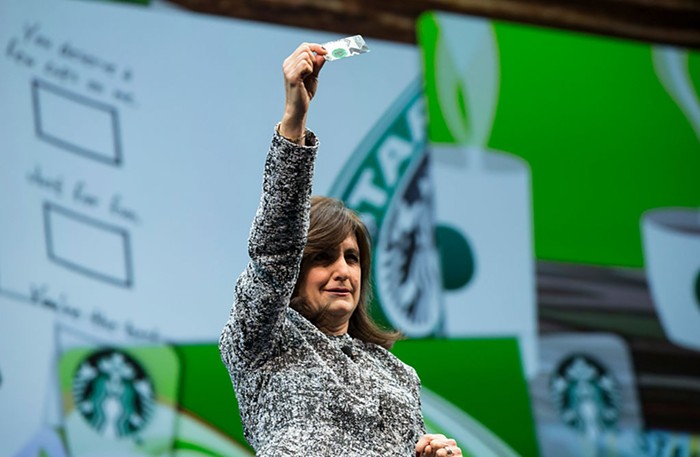
The people thinking about repealing Washington state’s new capital gains tax with a statewide ballot initiative are displaying audacity the size of Bezos's Balls.
According to public records filed last week, Steve Gordon, Howard Behar, Bill Bryant, and Brian Heywood are paying some of the most mercenary of our nation’s political consultants, such as Peri Hall & Associates and Mark Funk Public Affairs, to give the super-rich another tax break. Some of these consultants include those involved with the campaign that earned the nation’s largest-ever penalty for basically laundering contributions, resulting in a record-setting $18 million fine from WA State Attorney General Bob Ferguson.
Fortunately, success will be a long shot.
Conventional wisdom says Washingtonians vote against taxes, but those same voters just approved new property tax increases for schools across the state. Furthermore, according to The Olympian, recent polling shows that voters are smart enough to understand the difference between another regressive sales tax and one that finally makes the wealthiest among us pay their share: The capital gains repeal starts underwater at just 49%, with or without the help of serial loser and convicted money launderer Tim Eyman. Any competent political consultant knows that viable ballot initiatives should have a starting 60 - 70% approval rate.
And in a fun twist, with the capital gains tax law tied up in court for at least another six months thanks to a lawsuit brought by two right-wing think tanks, voters might be inclined to wait and see what the State Supreme Court does on the issue.
Aside from opening their wallets, the initiative funders seem intent on proving themselves to be studies in hypocrisy. No joke: Investor Collin Hathaway is pushing the anti-capital gains tax campaign “Opportunity for All Coalition” while living in a $9.2 million waterfront mansion and also claiming more than $6.62 million in taxpayer-funded COVID relief money.
He's not alone. New data shows that the vast majority of COVID relief funds went to the richest 20% of Americans, and only about a quarter of the $800 billion program went to protecting workers’ paychecks
And the hits keep coming. Last year, some members of the Washington Tech Industry Association signed a letter announcing their opposition to the capital gains tax, ostensibly because of the pandemic's dire implications on the prospects of tech startups. Publicola quickly clapped back, revealing that members of the association collectively scooped up $34 million in taxpayer-supported COVID relief, which served as padding for their investor rounds.
As it turned out, the pandemic caused the largest surge in technology investment in history. And startups were brought along for the ride. One reporter described it as “the hottest tech IPO market since the dot-com bubble in 2000.” One prominent Seattle investor summed it up this way: “Investors are licking their chops at the behavioral changes caused by the pandemic and how startups can provide solutions.”
They ought to be ashamed, especially in light of how many decent, affluent people in our industry make it a point of pride to earn wealth by building products that change the world, not simply by being in the right place at the right time.
Another grizzled veteran of the industry, who, like me, financially benefited from supercharged tech earnings and valuations, laid out the attitude toward the windfall wealth in no uncertain terms: "We didn't do anything different, we didn't innovate, we didn't build anything new, so darn right we should be taxed on it."
He’s right. In Washington's case, that’s a small (7%) capital gains tax on extraordinary stock profits that would go to funding schools, childcare, and early education programs. The state capital gains tax does not apply to small business sales, real estate sales, or sales of your IRA, 401k, or other retirement holdings. It also doesn’t apply to the first $250,000 in stock profits. (If you think the tax won't raise hundreds of millions of dollars a year despite those restrictions, here’s a teacher explaining how it works.)
So who in Washington will really end up paying this tax? A tiny percentage of people who've reaped millions, too many of whom not by creating jobs or by putting money into the state’s economy but rather by putting their money into Wall Street, venture capital firms, and hedge funds.
Meanwhile, the estimated $400 million raised each year from this tax will make significant improvements in our schools, open up more affordable childcare, and help kids through early learning programs. And by circulating more money in the local economy through more teaching and construction jobs, and through more childcare for working parents, the capital gains tax will pay off huge dividends for the state and for our communities for decades to come.
That’s what’s going to drive prosperity and innovation over the long haul in our state, making us all better off.
Now is not the time to go backwards. Even if we include the capital gains tax, Washington State still has the most unfair state and local tax system in the country. The richest here only pay about 3% of their income in state and local taxes, while those with the lowest incomes pay 17% or more. The capital gains tax on the super-rich is a good start to turning this around, and voters know it.
Bryan Kirschner is a technology executive.


















